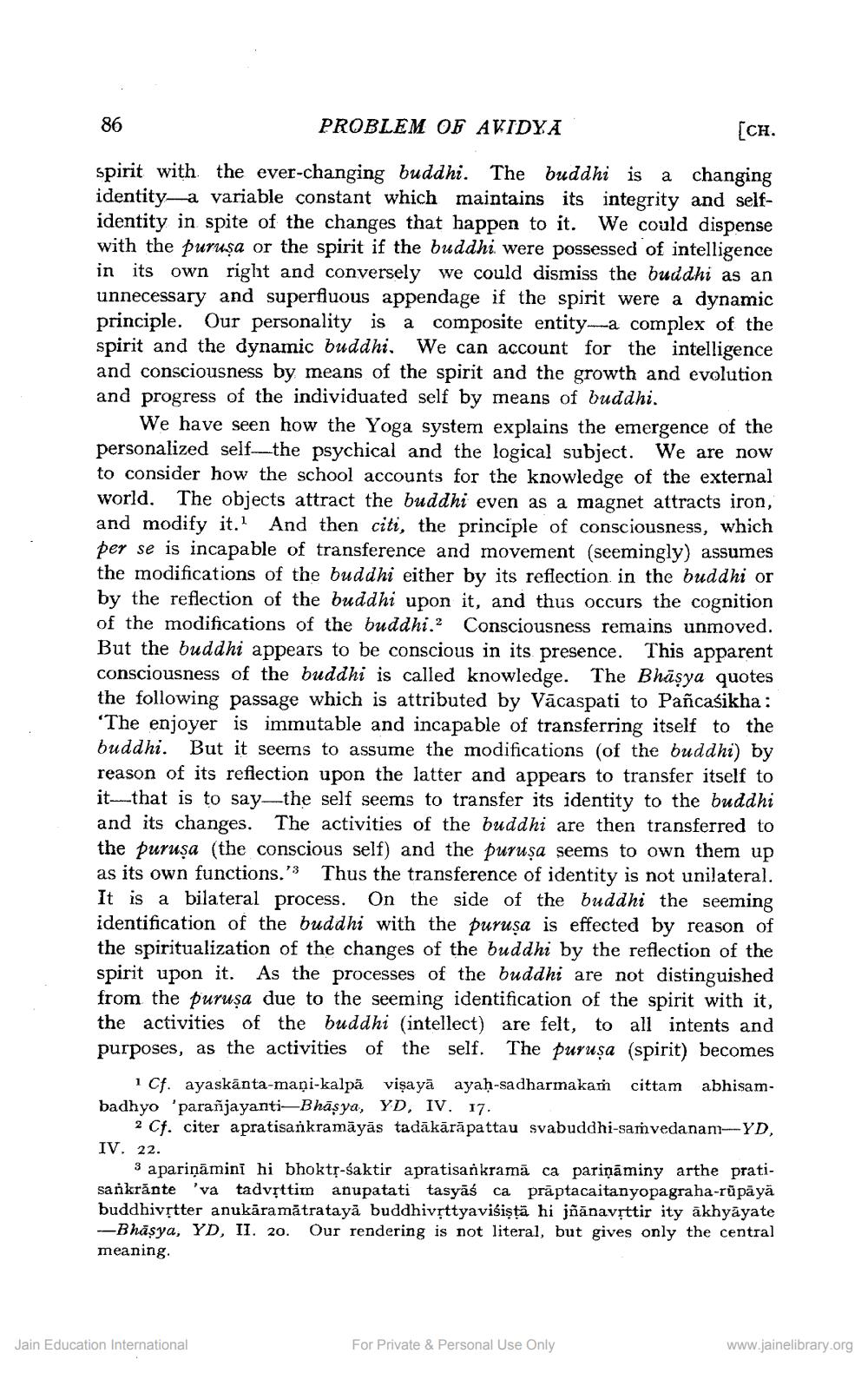________________
PROBLEM OF AVIDYA
[CH.
spirit with the ever-changing buddhi. The buddhi is a changing identity a variable constant which maintains its integrity and selfidentity in spite of the changes that happen to it. We could dispense with the puruşa or the spirit if the buddhi were possessed of intelligence in its own right and conversely we could dismiss the buddhi as an unnecessary and superfluous appendage if the spirit were a dynamic principle. Our personality is a composite entity-a complex of the spirit and the dynamic buddhi. We can account for the intelligence and consciousness by means of the spirit and the growth and evolution and progress of the individuated self by means of buddhi.
86
We have seen how the Yoga system explains the emergence of the personalized self-the psychical and the logical subject. We are now to consider how the school accounts for the knowledge of the external world. The objects attract the buddhi even as a magnet attracts iron, and modify it.1 And then citi, the principle of consciousness, which per se is incapable of transference and movement (seemingly) assumes the modifications of the buddhi either by its reflection in the buddhi or by the reflection of the buddhi upon it, and thus occurs the cognition of the modifications of the buddhi.2 Consciousness remains unmoved. But the buddhi appears to be conscious in its presence. This apparent consciousness of the buddhi is called knowledge. The Bhāṣya quotes the following passage which is attributed by Vacaspati to Pañcasikha: 'The enjoyer is immutable and incapable of transferring itself to the buddhi. But it seems to assume the modifications (of the buddhi) by reason of its reflection upon the latter and appears to transfer itself to it that is to say the self seems to transfer its identity to the buddhi and its changes. The activities of the buddhi are then transferred to the purusa (the conscious self) and the purușa seems to own them up as its own functions." Thus the transference of identity is not unilateral. It is a bilateral process. On the side of the buddhi the seeming identification of the buddhi with the puruşa is effected by reason of the spiritualization of the changes of the buddhi by the reflection of the spirit upon it. As the processes of the buddhi are not distinguished from the puruşa due to the seeming identification of the spirit with it, the activities of the buddhi (intellect) are felt, to all intents and purposes, as the activities of the self. The purusa (spirit) becomes 1 Cf. ayaskanta-maņi-kalpā viṣaya ayah-sadharmakam cittam abhisambadhyo 'parañjayanti-Bhāṣya, YD, IV. 17.
2 Cf. citer apratisankramāyās tadākārāpattau svabuddhi-samvedanam-YD, IV. 22.
3 apariņāminī hi bhoktṛ-śaktir apratisankrama ca pariņaminy arthe pratisankrante 'va tadvṛttim anupatati tasyaś ca prāptacaitanyopagraha-rüpäyä buddhivṛtter anukāramātrataya buddhivṛttyavisistä hi jñānavṛttir ity akhyāyate -Bhāṣya, YD, II. 20. Our rendering is not literal, but gives only the central meaning.
Jain Education International
For Private & Personal Use Only
www.jainelibrary.org




